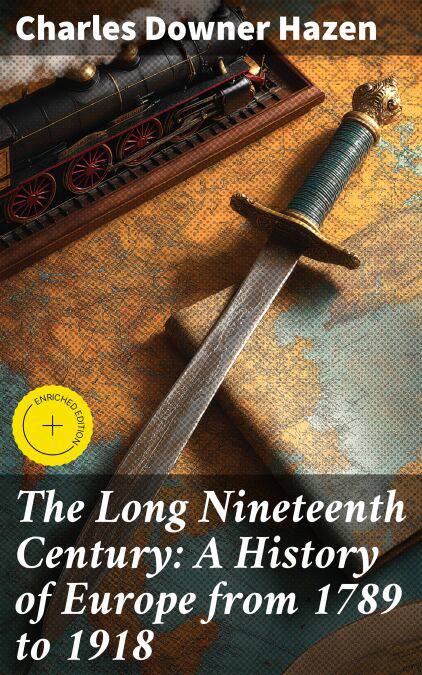
Bedankt voor het vertrouwen het afgelopen jaar! Om jou te bedanken bieden we GRATIS verzending (in België) aan op alles gedurende de hele maand januari.
- Afhalen na 1 uur in een winkel met voorraad
- In januari gratis thuislevering in België
- Ruim aanbod met 7 miljoen producten
Bedankt voor het vertrouwen het afgelopen jaar! Om jou te bedanken bieden we GRATIS verzending (in België) aan op alles gedurende de hele maand januari.
- Afhalen na 1 uur in een winkel met voorraad
- In januari gratis thuislevering in België
- Ruim aanbod met 7 miljoen producten
Zoeken
The Long Nineteenth Century: A History of Europe from 1789 to 1918 E-BOOK
Enriched edition. Europe's Transformation Through Revolution, Industry, and Nationalism
Charles Downer Hazen
E-book | Engels
€ 1,99
+ 1 punten
Omschrijving
In "The Long Nineteenth Century: A History of Europe from 1789 to 1918," Charles Downer Hazen offers a sweeping and meticulously researched account of a transformative period in European history. Encompassing the upheaval of the French Revolution, the rise and fall of empires, and the socio-economic shifts spurred by industrialization, Hazen's narrative is marked by a clear, engaging style that deftly synthesizes complex historical events into a coherent story. By situating these events within a broader literary and philosophical context, Hazen illuminates not only the political dynamics of the age but also the cultural currents that shaped European thought and society during this dynamic epoch. Charles Downer Hazen was a prominent historian and professor whose academic pursuits were often influenced by the historical narratives and identities evolving in his own time. Born in the late 19th century, he was deeply acquainted with the legacy of the events he chronicles and may have been driven to produce a comprehensive history that reflects on the roots and ramifications of modern Europe. Hazen's expertise in European history and his pedagogical passion are evident throughout the text, which serves both as an educational resource and a compelling narrative. This book is highly recommended for anyone interested in understanding the intricate tapestry of European history during the nineteenth century. Hazen's scholarly yet accessible approach makes it an excellent resource for students, historians, and general readers alike. His ability to intertwine factual detail with broader cultural themes provides invaluable insights into how the long nineteenth century continues to shape the contemporary European landscape.
In this enriched edition, we have carefully created added value for your reading experience:
- A succinct Introduction situates the work's timeless appeal and themes.
- The Synopsis outlines the central plot, highlighting key developments without spoiling critical twists.
- A detailed Historical Context immerses you in the era's events and influences that shaped the writing.
- A thorough Analysis dissects symbols, motifs, and character arcs to unearth underlying meanings.
- Reflection questions prompt you to engage personally with the work's messages, connecting them to modern life.
- Hand‐picked Memorable Quotes shine a spotlight on moments of literary brilliance.
- Interactive footnotes clarify unusual references, historical allusions, and archaic phrases for an effortless, more informed read.
In this enriched edition, we have carefully created added value for your reading experience:
- A succinct Introduction situates the work's timeless appeal and themes.
- The Synopsis outlines the central plot, highlighting key developments without spoiling critical twists.
- A detailed Historical Context immerses you in the era's events and influences that shaped the writing.
- A thorough Analysis dissects symbols, motifs, and character arcs to unearth underlying meanings.
- Reflection questions prompt you to engage personally with the work's messages, connecting them to modern life.
- Hand‐picked Memorable Quotes shine a spotlight on moments of literary brilliance.
- Interactive footnotes clarify unusual references, historical allusions, and archaic phrases for an effortless, more informed read.
Specificaties
Betrokkenen
- Auteur(s):
- Uitgeverij:
Inhoud
- Aantal bladzijden:
- 563
- Taal:
- Engels
Eigenschappen
- Productcode (EAN):
- 8596547672159
- Verschijningsdatum:
- 19/11/2023
- Uitvoering:
- E-book
- Beveiligd met:
- Digital watermarking
- Formaat:
- ePub

Alleen bij Standaard Boekhandel
+ 1 punten op je klantenkaart van Standaard Boekhandel
Beoordelingen
We publiceren alleen reviews die voldoen aan de voorwaarden voor reviews. Bekijk onze voorwaarden voor reviews.









